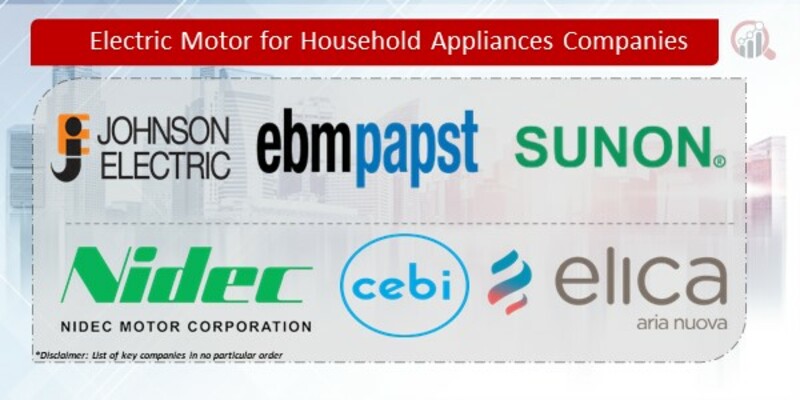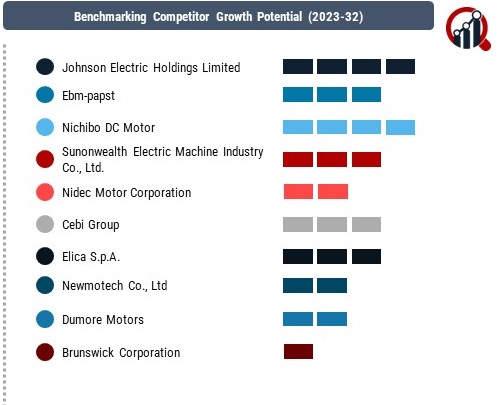Top Industry Leaders in the Electric Motor for Household Appliances Market

The Electric Motor for Household Appliances market's competitive landscape is a dynamic and continuously expanding space driven by rising demand for energy-efficient and eco-friendly appliances. As the globe embraces sustainability, the household appliance market has seen an increase in the adoption of electric motors that provide increased energy efficiency and lower environmental impact. This move has increased competition among prominent businesses vying for a significant market share.
In this competitive area, prominent competitors include Bosch, Siemens, ABB, General Electric, and Nidec Corporation. These industrial titans have risen to the top of the market by exploiting their enormous experience, technological competence, and worldwide reach. Bosch, for example, has continually introduced new electric motor technologies to improve the performance and economy of household appliances. Siemens, on the other hand, has carefully positioned itself as a provider of integrated systems for smart homes, in addition to electric motors.
These significant players' strategy revolve around research and development, partnerships, and mergers and acquisitions. Investing extensively in R&D efforts enables businesses to stay ahead of technological progress. General Electric, for example, has committed significant resources to developing high-performance electric motors with innovative features to meet consumers' changing expectations. Collaborations and collaborations with other industry participants have also become popular strategies. ABB, which is well-known for its expertise in power and automation technology, has developed strategic agreements to enhance its market position and product offerings.
Mergers and acquisitions have a critical role in creating the competitive environment of the household electric motor market. Nidec Corporation, a major industry participant, has undertaken an aggressive acquisition strategy in order to diversify its product range and boost its market position. Nidec has effectively expanded its services by acquiring firms with complementary technologies, ranging from small motors for kitchen appliances to larger motors for residential HVAC systems.
Several factors influence market share analysis in this competitive environment. Consumers must evaluate energy efficiency, cost-effectiveness, and the ability to interact smoothly with smart home devices. Key companies distinguish themselves by constantly enhancing these characteristics and delivering a varied selection of electric motors for various household appliances. Furthermore, the capacity to deliver customized solutions and adapt to regional preferences is important in acquiring market share.
In recent years, the competitive landscape has witnessed the emergence of new and creative businesses that are challenging conventional standards. Infinitum Electric and Powerhive, both financed by SoftBank, have entered the market with unique methods to electric motor design and use. Infinitum Electric, for example, focuses on designing electric motors that are lightweight and compact, with the goal of increasing energy efficiency and sustainability. Powerhive, on the other hand, takes a novel approach by combining electric motors into off-grid power solutions that serve underserved and isolated places.
To summarize, the competitive landscape of the Electric Motor for Household Appliances market is characterized by strong rivalry among prominent competitors, with each vying for market share through innovation. Established businesses like as Bosch, Siemens, ABB, General Electric, and Nidec Corporation dominate the industry due to their experience and global presence. To stay ahead in technology and grow product portfolios, strategies include R&D, partnerships, and mergers and acquisitions. Energy efficiency, cost-effectiveness, and integration with smart home devices all have an impact on market share analysis. The industry is also witnessing the creation of new and innovative companies, reflecting the market's dynamic nature. Sustainability, digitalization, and connection are driving investment trends, propelling the sector toward a future of smarter, more efficient household appliances.
Key Companies In The Electric Motor For Household Appliances Market Include –
- Johnson Electric Holdings Limited (Hong Kong)
- Ebm-papst (Germany)
- Nichibo DC Motor (China)
- Sunonwealth Electric Machine Industry Co., Ltd. (Taiwan)
- Nidec Motor Corporation (Japan)
- Cebi Group (Luxembourg)
- Elica S.p.A. (Italy)
- Newmotech Co., Ltd (South Korea)
- Diehl Stiftung& Co. KG (Germany)
- Dumore Motors (US)
- CG Power and Industrial Solutions Limited (India)
- NMB (US)
- Brunswick Corporation














